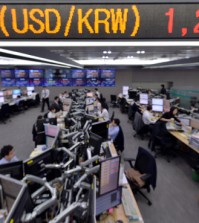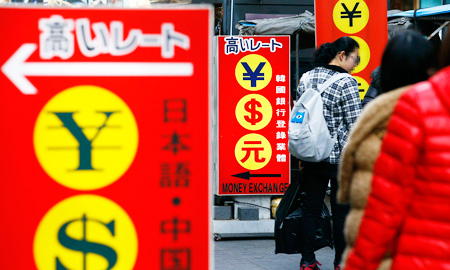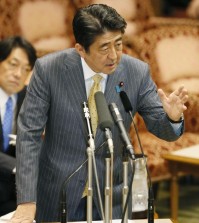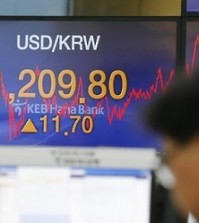- California Assembly OKs highest minimum wage in nation
- S. Korea unveils first graphic cigarette warnings
- US joins with South Korea, Japan in bid to deter North Korea
- LPGA golfer Chun In-gee finally back in action
- S. Korea won’t be top seed in final World Cup qualification round
- US men’s soccer misses 2nd straight Olympics
- US back on track in qualifying with 4-0 win over Guatemala
- High-intensity workout injuries spawn cottage industry
- CDC expands range of Zika mosquitoes into parts of Northeast
- Who knew? ‘The Walking Dead’ is helping families connect
Japanese yen falls below 1,000 won
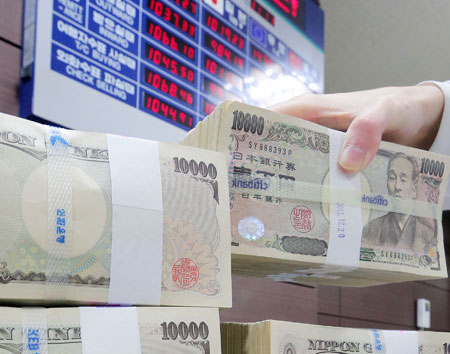
undles of 10,000-yen banknotes are stacked in front of an electronic billboard showing real-time currency exchange rates at a Korea Exchange Bank branch in Seoul, Monday. The Japanese yen fell below 1,000 won per 100 yen for the first time since Sept. 9, 2008. (Yonhap)
By Na Jeong-ju
The Japanese yen fell below 1,000 won per 100 yen during Monday’s trading session for the first time in nearly five years.
The yen dropped to 999.62 won as soon as the market opened at 9 a.m. That is the lowest level it has been since the yen hit a daily low of 996.68 won on Sept. 9, 2008. As of 3:40 p.m., the yen was trading at 1,001.61 won.
Policymakers here expressed concerns about the rapid appreciation of the won against the yen, saying they will take measures to protect firms vulnerable to the yen’s weakness.
They cautiously predicted that the won’s rise will not continue, citing growing doubts over “Abenomics,” a mixture of the aggressive monetary and fiscal policies of Japanese Prime Minister Shinzo Abe.
“We can’t deny that the yen’s slide is having a negative impact on Korea’s trade with Japan, but the impact seems to be very limited at the moment,” an official from the Ministry of Strategy and Finance said. “More Korean firms may be adversely affected by this trend, so we are planning to expand financing for them through the Export-Import Bank and the Korea Trade Insurance Corp.”
According to the Korea International Trade Association (KITA), the lobby for exporters, Korea’s exports to Japan may fall for the 10th consecutive month in November as the weak yen has squeezed the profit margins of Korean exporters. The November figure was not yet confirmed, but is expected to reach minus-five percent on-year.
During the January-November period, Korea’s exports to Japan fell 10.5 percent. The association predicted exports may drop further in December as well.
The KITA said Korea’s exports to Japan are forecast to rise 1.3 percent next year on the back of the global economic recovery. However, that’s still far lower than the overall export growth estimate of 6.4 percent for 2014.
The Japanese currency has been rapidly declining since Abe announced a package of monetary easing steps to overcome years of the effects of deflation of the Japanese economy. These measures have made the won more volatile.
The won is now taking different courses against the dollar and the yen.
The dollar is gaining ground again after the U.S. hinted at monetary stimulus tapering, but the Japanese government has continued bond-buying programs to inject liquidity, adding downward pressure on the yen.
A recent KITA survey showed 49 of the nation’s export items that compete with Japanese goods in the global markets, including cars, ships and petroleum products, were hit by the yen’s slide.
“Trade conditions for Korean exporters could worsen further in 2014 because Japanese firms, which have amassed huge profits thanks to the yen’s weakness, may move to lower prices of their goods,” a KITA spokesman said.







